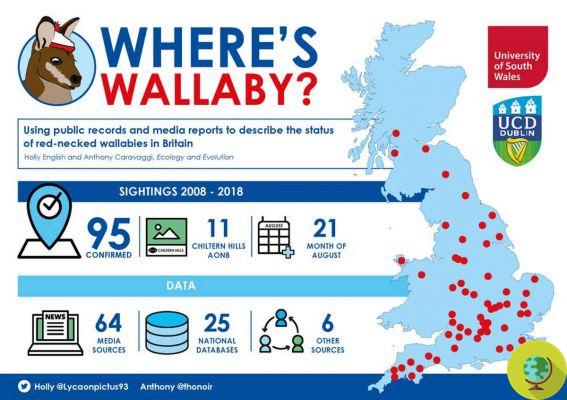Wallabies are native to Australia, but there have been numerous sightings in Britain in recent years as well.
He is about to end up run over, his mother saves himWallabies have been sighted countless times over the past decade across the UK, including Northern Ireland. That's right and it seems strange, but right in the farmland of England and in the midst of its unstable climate, the red-necked wallabies have found a home. Because?
This marsupial (Notamacropus rufogriseus) has been present in Great Britain for more than a century, practically imported to place it in zoos or private collections, where it was a real popular attraction. Over time, many wallabies have fled and adapted enough to survive in the British countryside.
This is why the number of wildlife in Britain has increased so much that eventually a population has settled in the Peak District (although it has probably been extinct since 2009). However, wild wallabies continue to be recorded across Britain, with occasional sightings even along the highway.
An "invasion" that could have negative consequences?
Of course. According to the “Where's wallaby?” Report, signed by the Universities of Dublin and South Wales, the introduction of invasive and non-native species can have substantial impacts on native species and wallabies can be no exception.
To find out what impact an established wallaby population in Britain might have, the scholars first wanted to establish where wild wallabies might be found, how often they are recorded and whether there are current and established populations.
Two years ago, scholars began to answer some of these questions by collecting data from news, social media and public data archives for the period 2008-2018.
We've added several new records to the map. Check it out!
Posted by UK Wallaby Sightings on Tuesday, April 30, 2019
From these data, now published in the journal Ecology and Evolution, they mapped the distribution of wallaby sightings across Britain.

©Lycaonpictus93
They are well registered 95 confirmed sightings between 2008 and 2018. Most were located in southern England, such as Kent:
View this post on Instagram
A post shared by @grumpyraver
The research sheds new light on wild wallabies in Britain but, as always with a study of this magnitude, it also raises more questions than answers.
For example, the wallaby population may have a negative impact on British native plants. They eat mainly grasses, roots and leaves and would compete with hares, rabbits and sheep. They may even exacerbate the growing impacts of muntjac deer. That said, wallabies are unlikely to be as destructive to vegetation in Britain as they are in New Zealand - although they are not native, mammalian grazing pressure is an established process in British ecosystems.
And not only that: wild wallabies could also carry diseases that can be transmitted to other species or to humans, such as leishmaniasis, fascioliasis and Salmonella.
Friend (not on twitter) in devon just come accoss this on country rd.Anyone missing a wallaby/kangaroo?! #devon pic.twitter.com/SlYyXo4ZeF
— Charlotte Read (@CharlHob) September 22, 2014
Fonte: Ecology and Evolution
Read also:
Kangaroos and wallabies are exhibiting reproductive anomalies from a common herbicide


























